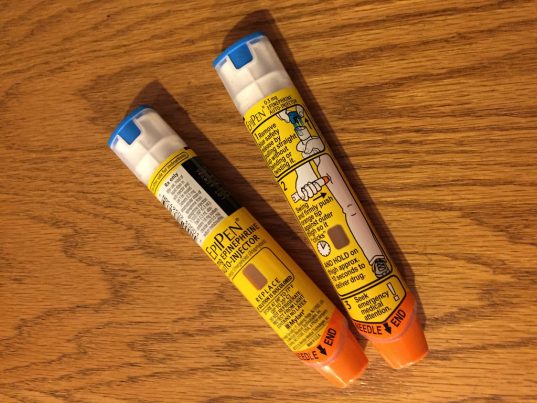
EpiPen maker only cares about sales, not human lives
Friday, October 20, 2017 by Tracey Watson
http://www.depopulation.news/2017-10-20-epipen-maker-only-cares-about-sales-not-human-lives.html

Mylan Pharmaceuticals has had a rough time of it in the past 18 months or so. The pharma giant is the distributor of the live-saving EpiPen – a device which administers exact doses of epinephrine (adrenaline) using special autoinjector technology. When someone has a life-threatening allergic reaction to peanuts, shellfish, etc., they can inject themselves with the EpiPen and it will allay the symptoms long enough for them to get to the hospital. Having already lost all respect for upping the price of this lifesaver from around $55 in 2007 to over $600 in 2016 for a standard two-pack, Mylan has come under shared fire from the U.S. Food and Drug Administration (FDA) for callously continuing to distribute faulty EpiPens, even after their manufacturer was advised that they were malfunctioning. Some users have become seriously ill as a result of the faulty EpiPens, while others have reportedly died.
A letter from the FDA to Meridian Medical Technologies Inc., a Pfizer Company, which manufactures the EpiPens for Mylan, lays out the agency’s accusations:
Among other things, you manufacture two epinephrine auto-injectors at your facility, EpiPen and EpiPen Jr., (collectively, EpiPen products). These products are intended to deliver a lifesaving drug (epinephrine) during emergency treatment of serious allergic reactions, including anaphylaxis. If your auto-injectors do not operate as expected and deliver the intended amount of epinephrine drug when deployed in emergencies, patients can die or suffer serious illness. You failed to thoroughly investigate multiple serious component and product failures for your EpiPen products, including failures associated with patient deaths and severe illness. You also failed to expand the scope of your investigations into these serious and life-threatening failures or take appropriate corrective actions, until FDA’s inspection.
The letter goes on to accuse Meridien of failing to take appropriate action after discovering a faulty autoinjector component called a Power Pak, which ensures that the autoinjector fires correctly and injects the exact dose of epinephrine. Though the company rejected that lot and one other of Power Paks, they did not examine any units produced from that lot to check if their Power Paks were faulty. And despite instructing the supplier of the Power Paks to initiate an investigation into the faulty components, Meridien continued to manufacture autoinjectors using more of the same possibly faulty parts.
The FDA notes in its letter that Meridien and Mylan received hundreds of letters of complaint stating that the autoinjectors were not firing properly, and when Meridien investigated the matter they determined in 2016 that in the case of at least one of these customers, the failure to fire was a direct result of a faulty Power Pak. Nevertheless, the company decided that the fault was “infrequent,” and made no effort to expand the investigation.
In March, the company was forced to recall thousands of EpiPens after multiple people were left in the lurch in life-threatening circumstances when their EpiPens were found to be faulty. (Related: Democrat Senator’s daughter raised price of EpiPen, rakes in millions from cronyism.)
Pfizer, which owns Meridien, has come out firing in response, insisting that the fault lies with the “non-medically trained individuals” using the EpiPens. Isn’t that the whole point, though? If medical training is required to administer the EpiPen, then why have they sold 30 million of them to untrained people – many of them children – in the past two years alone? (Related: What else has Big Pharma been up to? Find out at Medicine.news.)
Pfizer/Meridien – and by extension Mylan – has not accepted any responsibility for the deaths and injuries related to the faulty devices.
“We currently have no information to indicate that there was any causal connection between these product complaints and any patient deaths,” Pfizer said in a statement.
Mylan, which is ultimately responsible for distributing the autoinjectors to the public, carries a heavy burden of guilt. Ironic, considering what the company’s own website claims regarding integrity:
Doing what’s right is sacred to us. We behave responsibly, even when nobody’s looking. We set high standards from which we never back down. This uncompromising ethical stance helps to keep our products pure, our workers safe and the environment clean.
Really? Apparently not.
Sources include:
Tagged Under: Tags: autoinjectors, Big Pharma, corporate corruption, epipen, FDA, life saving medicine, Meridien Technologies, Mylan Pharmaceuticals, Pfizer, product failure





